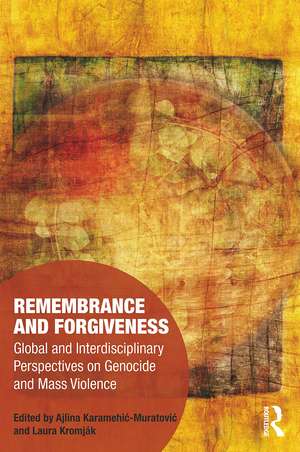Remembrance and Forgiveness: Global and Interdisciplinary Perspectives on Genocide and Mass Violence: Memory Studies: Global Constellations
Editat de Ajlina Karamehić-Muratović, Laura Kromjáken Limba Engleză Paperback – 29 apr 2022
| Toate formatele și edițiile | Preț | Express |
|---|---|---|
| Paperback (1) | 260.33 lei 6-8 săpt. | |
| Taylor & Francis – 29 apr 2022 | 260.33 lei 6-8 săpt. | |
| Hardback (1) | 1001.51 lei 6-8 săpt. | |
| Taylor & Francis – 27 oct 2020 | 1001.51 lei 6-8 săpt. |
Din seria Memory Studies: Global Constellations
-
 Preț: 326.49 lei
Preț: 326.49 lei -
 Preț: 310.41 lei
Preț: 310.41 lei - 9%
 Preț: 1004.83 lei
Preț: 1004.83 lei -
 Preț: 288.29 lei
Preț: 288.29 lei -
 Preț: 362.57 lei
Preț: 362.57 lei - 18%
 Preț: 1000.27 lei
Preț: 1000.27 lei - 18%
 Preț: 1001.55 lei
Preț: 1001.55 lei -
 Preț: 389.38 lei
Preț: 389.38 lei - 12%
 Preț: 312.43 lei
Preț: 312.43 lei -
 Preț: 389.11 lei
Preț: 389.11 lei - 18%
 Preț: 892.61 lei
Preț: 892.61 lei -
 Preț: 387.65 lei
Preț: 387.65 lei -
 Preț: 410.16 lei
Preț: 410.16 lei -
 Preț: 326.49 lei
Preț: 326.49 lei - 17%
 Preț: 258.50 lei
Preț: 258.50 lei -
 Preț: 385.54 lei
Preț: 385.54 lei - 18%
 Preț: 996.17 lei
Preț: 996.17 lei - 18%
 Preț: 1004.72 lei
Preț: 1004.72 lei -
 Preț: 389.38 lei
Preț: 389.38 lei - 13%
 Preț: 297.79 lei
Preț: 297.79 lei - 16%
 Preț: 273.05 lei
Preț: 273.05 lei -
 Preț: 423.30 lei
Preț: 423.30 lei - 18%
 Preț: 895.32 lei
Preț: 895.32 lei - 17%
 Preț: 257.68 lei
Preț: 257.68 lei - 13%
 Preț: 296.95 lei
Preț: 296.95 lei -
 Preț: 309.75 lei
Preț: 309.75 lei - 18%
 Preț: 1001.51 lei
Preț: 1001.51 lei - 18%
 Preț: 919.43 lei
Preț: 919.43 lei -
 Preț: 389.38 lei
Preț: 389.38 lei - 18%
 Preț: 1003.99 lei
Preț: 1003.99 lei
Preț: 260.33 lei
Preț vechi: 311.59 lei
-16% Nou
Puncte Express: 390
Preț estimativ în valută:
49.82€ • 51.70$ • 41.64£
49.82€ • 51.70$ • 41.64£
Carte tipărită la comandă
Livrare economică 17-31 martie
Preluare comenzi: 021 569.72.76
Specificații
ISBN-13: 9780367564148
ISBN-10: 0367564149
Pagini: 252
Ilustrații: 8
Dimensiuni: 156 x 234 mm
Greutate: 0.47 kg
Ediția:1
Editura: Taylor & Francis
Colecția Routledge
Seria Memory Studies: Global Constellations
Locul publicării:Oxford, United Kingdom
ISBN-10: 0367564149
Pagini: 252
Ilustrații: 8
Dimensiuni: 156 x 234 mm
Greutate: 0.47 kg
Ediția:1
Editura: Taylor & Francis
Colecția Routledge
Seria Memory Studies: Global Constellations
Locul publicării:Oxford, United Kingdom
Public țintă
Postgraduate and UndergraduateCuprins
1.Aboriginal History: Amnesia and Absolution 2.Remembrance and Renewal at Tuluwat: Returning to the Center of the World 3.Merits and Shortcomings of the South African Truth and Reconciliation Commission 4.Commemoration and Healing: Finding a Balance between State and Local Mechanisms for Dealing with the Historical Wounds of the 1965 Anti-Communist Violence in East Nusa Tenggara Province, Indonesia 5.The Red Terror of the Derg Regime: Memorialization of Mass Killings in Ethiopia 6.Memory and Ways to Represent Judgments against Cases of Genocide in Argentina: A Concept to Analyze the Written Press 7.Genocide Memorialization and Gendered Remembrance in Guatemala and Cambodia 8.Reconciling a Divided Society through Truth, Memory and Forgiveness: Lessons from El Salvador and Guatemala 9.The Politics of Forgiveness and Bearing Witness after a Genocidal War: Three Short Films from Bosnia-Herzegovina 10.Competing Narratives of Destruction and Development: The Politicization of Memory in Post-Genocide Rwanda 11.Assessing the Many Faces of Transitional Justice in Timor-Leste 12.Pomnit’ nel’zja zabyt’: Remembering and Forgetting the Wars in Post-Soviet Chechnya 13."Sorry Seems to Be the Hardest Word": Israeli Peace-Oriented NGOs Lack of Apologetic Discourse 14.Forgiveness Education: Rationalization among Arab Educators in the Middle East 15.South Sudan: Difficult Road to Remembrance and Forgiveness 16.Violent Recall: Genocide Memories, Literary Representation, and Cosmopolitan Memory
Notă biografică
Ajlina Karamehić-Muratović is an Associate Professor in the Department of Sociology and Anthropology at St. Louis University, St. Louis, MO.
Laura Kromják is an Assistant Professor in the Department of International Relations at Tomori Pál College, Budapest, Hungary.
Laura Kromják is an Assistant Professor in the Department of International Relations at Tomori Pál College, Budapest, Hungary.
Descriere
An enquiry into the social science of remembrance and forgiveness in global episodes of genocide and mass violence during the post-Holocaust era, this volume explores the ways in which these have changed over time and how remembrance and forgiveness have been used in more recent cases of genocide and mass violence.
